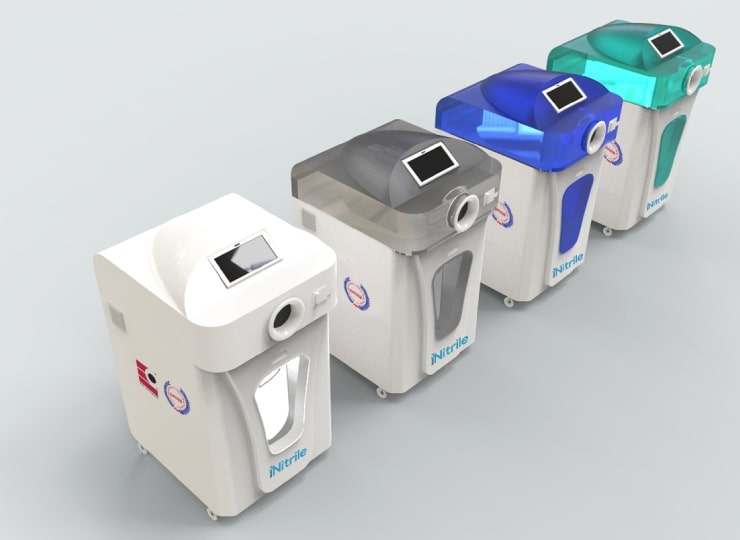Healthcare startups are introducing new ideas that could redefine the field in the United States and around the world. One company making headlines recently is Texas Medical Technology, whose subsidiary, iNitrile, has developed a system to dispense personal protective equipment (PPE) safely and reliably to end users.
The iNitrile machine automates the process of putting on sterile gloves to help prevent the spread of infection while also minimizing waste. If gloves are not donned correctly, they must be discarded because they are no longer sterile. However, the iNitrile machine is designed to guarantee that users always put on gloves correctly, which reduces waste and therefore costs.
Major Challenges Associated with Disposable Gloves
The COVID-19 pandemic has heightened our awareness of proper PPE use in hospitals and other healthcare facilities.
Of course, we have long known that pathogens can be transmitted via surfaces that people generally consider safe. For example, infections can be spread through disposable gloves and other PPE that is not donned correctly. In addition, people may leave boxes of disposable gloves sitting open, which leaves them vulnerable to pathogens. If pathogens get in the glove box, it could be possible to transmit them even if the gloves are put on correctly.
In 2016, the U.S. FDA passed a regulation prohibiting powdered examination and surgeon’s gloves, as well as absorbable power for lubricating surgeon’s gloves. The agency cited an unreasonable and potentially substantial risk to patients and health care providers. However, unpowdered gloves can be more difficult to put on and take off.
Another major issue with disposable gloves is the waste involved. Globally, about half of all disposable gloves are discarded before they are even used. This happens because people put them on incorrectly, accidently pull out more than one at a time, or tear them accidentally while donning.
Because of the pandemic, demand for gloves has soared and this kind of waste can make it difficult for manufacturers to provide sufficient supply. Furthermore, this waste drives up costs for healthcare organizations.
Noticing these major issues, the iNitrile team set out to come up with a solution that would make disposable gloves safer for clinical use and reduce waste.
How the iNitrile System Works
The iNitrile system is essentially an automatic dispenser for disposable gloves. The machine first has a check-in function that is tied to radio-frequency identification on a badge or tag. This function ensures that only authorized users are able to get gloves from the machine. Once the user’s identity is confirmed, the machine opens a compartment, and users insert their hands directly into inflated gloves—they don’t need to touch the outside of the gloves or pull on them to adjust the fit. The iNitrile system is connected to a cloud-based network that allows real-time tracking of usage statistics. The machine can be used with both latex and nitrile gloves.
The iNitrile system was designed to help organizations improve their safety and infection control protocols amid the pandemic. Easy access to gloves that are guaranteed to be sterile could significantly reduce rates of infection even beyond the pandemic. Furthermore, the device has the potential to help organizations cut their operating costs significantly. Texas Medical Technology estimates that glove waste could be reduced by up to 40 percent over the first year of adoption. Furthermore, the built-in management software that connects to the cloud can improve inventory management and prevent glove shortages by sending notifications when orders need to be placed.
Major Investments in the iNitrile Glove System
Recently, Texas Medical Technology announced that iNitrile had raised $33 million to develop the machine further. This funding was raised by the parent company’s cofounder and CFO, Jad Shraim. The iNitrile team plans to use this money to construct a new factory in the United States. Commercial production of the iNitrile machine is slated to begin in September.
While the pandemic highlighted the need for no-contact glove donning machines, their value extends well beyond COVID-19, especially in terms of reducing medical waste and saving money on supplies. While the machine represents an upfront investment, the reduced waste could help convince organizations to purchase it depending on how severe they see the issue to be.
Texas Medical Technology itself is a company founded during the pandemic and focused on providing PPE. The company launched in March 2020 and its sales had grown to $50 million by November. The company offers a wide array of PPE and has partnered with hospitals, clinics, corporations, and individuals. The partnership between this company and iNitrile as a subsidiary seems a natural fit and could produce other no-contact PPE dispensing systems in the future. Putting on virtually all pieces of PPE, from sterile gowns to respirators, requires training in the proper procedures and protocols. If not done correctly, both providers and patients are put at risk.

